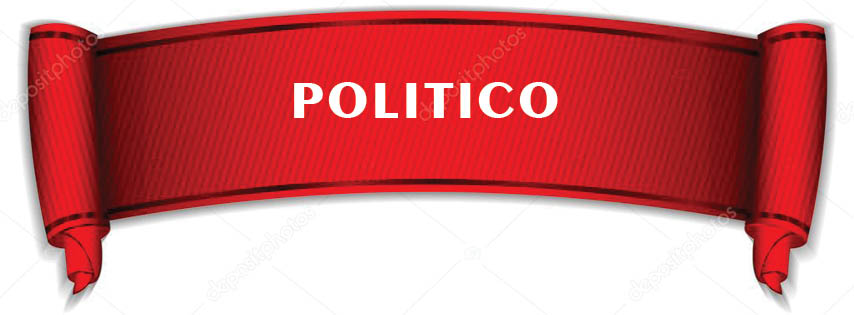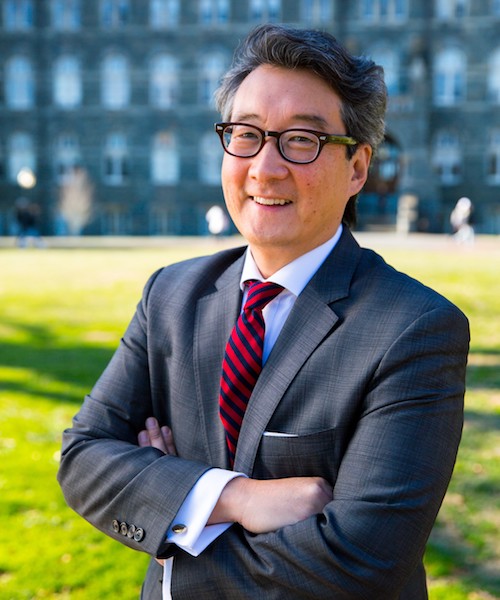
North Korea: The Impossible State
White House Security Advisor Victor Cha pulls back the curtain on the Kim Dynasty and future of the Hermit Kingdom.

White House Security Advisor Victor Cha
The 45th President of the United States is a provocateur. His poker face and bluster combine into a White House that appears without a coherent foreign policy agenda. Those within his gilded cage know that tables are set with precision. But the crumbs that he throws — both to and fro — are the crux of blithe and derision.
President Trump began stirring the pot of U.S.-China relations when he accepted a congratulatory phone call from Taiwan's President Tsai Ing-wen for the win. Taiwan is a small island off the coast of China and not a sovereign nation, according the One-China Policy, and the PRC refuses diplomatic relations with any country that recognize the ROC. Its Political Science 101 and Trump knew it. Or did he?
Trump is a transactional person. He reacts, often in the moment, to the information and people around him. He comes to office with no well-formed ideology, an evolving understanding of history and government, and a clear goal of using his business salvo to govern.
When candidate Trump proclaimed that the PRC purposely devalued their own currency, declared that he’d impose a 5% import tax on China during his campaign, and vehemently promised to prevent the PRC from dumping steel into US markets there was little, if any, response from Beijing. However, when he pronounced that he’d “prevent China from developing islands in the South China Sea” he hit a nerve. "Unless or until Washington plans to wage a large-scale war in the South China Sea, any other approaches to prevent Chinese access to the islands will be foolish,” the communist controlled Global Times warned. And the U.S. blinked.
Nary 4 weeks later the two presidents were noshing on pan-seared Dover at Mar-a-Lago: Trump’s Winter White House in Palm Beach. While the U.S. Air Force was lobbing 59 cruise missiles at a Syrian military air field that evening, Trump was offering Xi Jinping “the most beautiful piece of chocolate cake you’ve ever seen.” But it was Arabella Kushner’s recital that caught the tabloid's attention. At just 5 years old, Trump’s granddaughter serenaded the two most powerful men in the world with a recital in Mandarin Chinese called Jasmine Flower. And the world swooned.
The Chinese say “A bird doesn’t sing because it has an answer. It sings because it has a song.” Unless, of course, your a parrot prone to repetition and paradox. Indeed, candidate Trump’s consternations toward China seem now more like propaganda than policy initiatives, and, of his first 100 days in office, he’s openly wined and dined Japan and China, too. But for a remarkable national drama in which a corruption scandal, mass protests and impeachment recently forced the South Korean president from office, leaving the conservative establishment in disarray and its former leader in jail, it can otherwise be said that America’s foreign policy in the Far East is at present collaborative. Except for Kim Jong-un.Korea
Simmering along the 38th Parallel are two countries sharing the Korean Peninsula. Intruders, foreign occupiers, and imperialists have informed the nations now called North and South Korea for centuries. Korea was originally an independent, though tributary vassal state of Imperial China (7-19c). The Empire of Japan took control of Korea from 1910 through their defeat in WWII, after which it was carved up between the U.S. and USSR in 1945. Tensions ensued between its northern and southern halves resulting in the Korean War from 1950-1953 and finally armistice.
At the turn of the 21st century, the two nations agreed to work toward peaceful reunification. Two inter-Korean Summits followed (2000, 2007) intending to replace the armistice that ended the Korean War with a permanent peace treaty. However, those talks failed due to fundamental disagreements on the Korean Demilitarized Zone, human rights issues, and the development and testing of nuclear weapons that resulted in a Cold War.
Skirmishes and rhetoric ensued between the North and South over the next 8 years in particular, but the pitch became particularly vitriolic in 2017. Last month, the USS Carl Vinson joined the USS Michigan in the waters off the Korean Peninsula sometime after Trump touted “we’re sending an armada.” In a telephone call to Philippine Dictator Rodrigo Duterte days before he leaked, “we have two nuclear submarines over there — the best in the world — we have a lot of fire power over there.” Simultaneously, Chinese state-run media reported that 150,000 Chinese troops were approaching North Korea's border.
How did a historically homogenous people become locked in a perpetual struggle for supremacy and how can they be reconciled? I recently spoke with White House National Security Council’s Victor Cha about his seminal work The Impossible State: North Korea, Past and Future.ributary System
To understand the present we often look to the past. From the 7th century, the Imperial Chinese tributary system was the network of trade and foreign relations between China and its tributaries that shaped much of East Asia. Contrary to other tribute systems around the world, the Chinese tributary system consisted almost entirely of mutually beneficial economic relationships, and member states of the system were often politically autonomous. Through the tribute system, which facilitated frequent economic and cultural exchange, Imperial China deeply influenced the economies, complex societies and cultures of the Far East. After WWII, the United States installed military installations in Japan and South Korea in particular, and began forging international trade relations in the Far East.World Trade Organization
In 1948 the United States joined the General Agreement on Tariffs and Trade (GATT), the predecessor of the World Trade Organization. According to its preamble, its purpose was the "substantial reduction of tariffs and other trade barriers, and the elimination of preferences on a reciprocal and mutually advantageous basis."
The People's Republic of China was the most important country in this group, but required an annual waiver to maintain free trade status. Bill Clinton, in the last year of his presidency, implored Congress to change China’s trade relation’s status with the U.S. to permanent. It was vital to U.S. agriculture to access a market that accounts for one-fifth of the world’s population, and he believed a congressional bill would help the economy stay stimulated. Indeed, US imports from China more than quadrupled between 2000 and 2015, increasing the decline of US manufacturing jobs in the United States and crowning China the second largest economy in the world. Since the passing of the bill there have been three attempts to repeal the PNTR with China, and perhaps the most bombastic proponent was candidate Donald Trump.
When Trump pulled out of the Paris climate accord on June 1, he positioned China to reorder the world’s power structure. His decision is perhaps the greatest strategic gift to the Chinese who're eager to fill the void that Washington is leaving around the world on everything from setting the rules of trade and environmental standards to financing the infrastructure projects that give Beijing vast influence.China-North Korea
Days after President Trump’s charm offensive on President Xi Jinping to clamp down on trade with North Korea, China announced that trade with the Hermit Kingdom had actually expanded. Even though it had complied with United Nations sanctions and stopped buying North Korean coal, a major source of hard currency for Pyongyang, China’s trade with North Korea grew 37.4 percent in the first quarter of this year from the same period in 2016. Chinese exports surged 54.5 percent, and imports increased 18.4 percent, the General Administration of Customs said at a news conference in Beijing. Art of War
“All warfare is based on deception,” wrote Sun Tzu, the Chinese General and philosopher whose seminal work “The Art of War” shaped military strategy during the Middle Ages. The “Seven Military Classics” were complied during the Song Dynasty, and, it can fairly be said, informed the tributary system. The philosophy endured, permeated to the west, and was popularized in the 1987 movie “Wall Street.” A wealthy, unscrupulous corporate raider applies tactics of warfare to business. A self professed favorite of Donald Trump.
Power can manifest as paradox or principle but is always driven by passion. Candidate Trump for instance slammed Wall Street for "getting away with murder." He vowed to “break up the big banks and force the finance guys to pay higher taxes.” His final campaign ad showed ominous photos of Goldman Sachs CEO Henry Paulson and proclaimed “its time to put an end to the political and business elites that have bled our country dry.” The message resonated with a base who’d watched stock prices surge and big bonuses come roaring back after the financial crisis.
President Trump then did a rapid U-turn on big banks in his first 100 days. He's stacked his cabinet with Wall Street types (especially from Goldman Sachs) and instead of talking about breaking up banks, focused on easing and rolling back their regulations. Trump danced away from the populism he campaigned on and into the arms of Wall Street. Principles, however, are only principles if we stand by them when they’re inconvenient. Despite Mr. Trump’s campaign vow to try to reduce the influence of lobbyists in Washington, the White House has granted at least 16 senior staff members’ dispensation to work on policy matters they handled while employed as lobbyists. So much for ‘draining the swamp.' Three Kingdoms
Those who sacrifice liberty for security often deserve neither and lose both. The Three Kingdoms of Korea were once vibrant, state-level societies from 57 BC through 668 AD before China’s Tang Dynasty began incorporating them as protectorates. Goguryeo, likely the first established, most advanced, and largest military state was set in modern-day Pyongyang. Silla was the smallest and weakest, but used cunning diplomatic means to make opportunistic pacts and alliances with the more powerful Korean kingdoms, and eventually Tang China, to its great advantage. And the southwestern kingdom of Baekje — situated in modern-day Seoul — was founded by a Goguryeo prince. The third son of the founder of Goguryeo, Onjo of Baekje would immigrate to the south and lay the foundations for peace, strength and mercy that would last for 678 years.DPRK
Sitting at the heart of the most vibrant economic region of the world, the DPRK has the world’s second largest economy on its border (China), the third largest economy across the sea (Japan), and the fifteenth largest economy contiguous to it, with which it shares a common language (South Korea). While the 2016 South Korean political scandal saw president Park Geun-hye impeached and imprisoned over an abuse of her power, North Korea’s Supreme Leader Kim Jong-un queues into the world’s most irrepressible world dictator. How has an impoverished, socialist nation heavily dependent on food rations and housing subsidies come to steer the narrative amongst its powerful neighbors?
North Korea prospered during the Cold War years when their economy thrived, their military was strong, and they’d aligned with powerful friends in the socialist world. Juche, meaning self-reliance, was claimed as the original, brilliant and revolutionary contribution by Supreme Leader Kim Il-sung. Seemingly reductive of Marxism–Leninism, Juche was adopted into a set of principles that the North Korean government has used to justify its policy decisions from the 1950s onwards. Such principles include moving the nation towards "jaju" (independence) through the construction of "jarip" (national economy) and an emphasis upon "jawi" (self-defense), in order to establish socialism. Jargon eerily similar to the populist campaign Donald Trump ran in 2016 albeit with a caveat to democracy.
North Korea's founder Kim Il-sung rejected the concept of civil rights for people who oppose the regime. “The individual is the master of his own destiny,” the ideology claimed, driving its people with propaganda and coercion into building the first dynasty of the modern era. The ideology was the crux of North Korea’s control over its people during the Cold War years calling for a complete and total subservience to a leadership that effectively starved its people while it built nuclear weapons, a voracious military, and opulent palaces for the Kim family.
The collapse of the Eastern Bloc, particularly the Soviet Union, forced North Korea to realign its foreign economic relations. While its Command Economy relies on fundamentally non-pecuniary (not readily quantified or valued in money) incentives, it is unavailing to compare it side by side to a free market economy. However, the otherwise isolated regime’s antics tend to jigger financial markets in the region making it an influencer of Asia’s biggest economies.The Economics of War
Tensions on the Korean Peninsula cause economic shifts to Asia’s biggest economies. Generally, indexes fall when investor moods are dominated by geopolitical concerns. However, while North Korea’s provocations could simply be aimed at bringing Washington to the negotiating table, they’re saber rattling is already having an economic effect.
For instance, when Trump said the United States could act alone against North Korea if necessary last month, the Japanese yen, generally seen as a safe haven in times of crisis, gained about 3 percent against the South Korean won. The yen continues to climb concurrent with tensions in the region.
Conversely, China’s response to South Korea’s installation of the U.S. Terminal High Altitude Area Defense missile system (THAAD) comes with repercussions. Beijing has flexed its economic muscles by restricting Chinese tourism to South Korea, closing Korean-owned Lotte stores, and blocking imports of Korean cosmetics and TV shows. “We don’t have to make the country bleed,” China’s Global Times newspaper warned in response to THAAD, “but we’d better make it hurt.”
While Beijing causally condemns its neighbor’s nuclear developments and human rights abuse, China’s cautious policies ultimately serve North Korea’s stability. “China needs a buffer between themselves and a peninsula already occupied by 28,000 American military troops,” Cha says, “and uses its own vulnerability and risk-taking behavior to get sustenance, diplomatic support, and protection from its ambivalent big brother.” In the catastrophic wake of Hiroshima, Nagasaki and the Korean War, conservative estimates tally nearly one quarter of a million casualties, it is fair to say that nobody in the region or beyond wants war. However, North Korea’s 12 recorded tests since February are serving as a salient bargaining chip. The Sunshine Policy
Through its delicate navigation of North Korea’s diplomatic and social history, The Impossible State outlines how an impoverished and isolated nation came to embrace its despotic nature. Cha marvels at the state’s ability to survive when other authoritarian regimes throughout history have fallen. But while the White House stands accused of obstructing FBI inquires, sharing classified information with Russia, and courting dictators like Erdogan, Al-Sisi and Duterte, it may be that Authoritarianism is on the rise.
While Cha remains sure that North Korea will eventually fall and be replaced by a unified Korean peninsula, the son of a North Korean refugee — Moon Jae-in — enters the stage as South Korea’s newly elected president. A Human Rights lawyer by trade, he’s returned the nation’s liberals to power after nearly a decade in the political wilderness. He eschews the luxurious perk of living in the presidential palace, and has demanded a probe over the contentious American missile defense system — THADD — in South Korea.
Moreover, The Sunshine Policy — the theoretical basis for South Korea's foreign policy towards North Korea from 1998 to 2008 — seems to be on the rise as well in the Seoul Special City. In 1988, South Korean President Kim Dae-jung outlined a policy meant to soften North Korea’s attitude towards the South. Though the name was lifted from Aesop’s Fable, the idea was based on the traditional Korean ways of dealing with enemies by giving them gifts to prevent them from causing harm. The main aim of the policy was to soften North Korea's attitudes towards the South by encouraging interaction and economic assistance. The national security policy had three basic principles: a) No armed provocation by the North will be tolerated, b) The South will not attempt to absorb the North in any way, and c) The South actively seeks cooperation.
These principles were meant to convey the message that the South does not wish to absorb the North or undermine its government; its goal was peaceful co-existence rather than regime change. In 2000, South Korean President Kim Dae-jung was awarded the Nobel Peace Prize for his successful implementation of the Sunshine Policy. Moon Jae-in is currently the second Roman Catholic to become President of South Korea, after Kim Dae-jung, and arguably his political and philosophical protégée. Conclusion
Trump and Kim share a sense of entitlement that drives their destiny. They’ve dwelled in palaces their entire lives entranced by stories of wealth, privilege and power. Unaware of everyday life outside their castle walls, they wiled away their youth in elite boarding schools, averted military service, and, at the age of 27, merely inherited the keys to their family's business. Their short political careers have been marred by perpetual conflict, and, it is fair to assume, political conflict will remain the brightest jewel in their crowns.
There was a Fourth Kingdom of Korea that is seldom mentioned and oft forgot. Called Gaya, the Nihon Shoki — the second oldest book of classical Japanese History — claimed that Gaya was a military outpost of Japan during the Yamoto period (300-710). While there is no evidence to support this claim, the propaganda was used by the Empire of Japan to invade Korea in 1910. The rest, of course, is history.
As Trump roars and urges the world to step up pressure on Pyongyang, he comes face to face with an unconventional ally with deep roots in activism, civil rights and reality. Called the Dark King, South Korean President Moon Jae-in may yet match swagger and ego with sunshine and peace on the Korean Peninsula.






